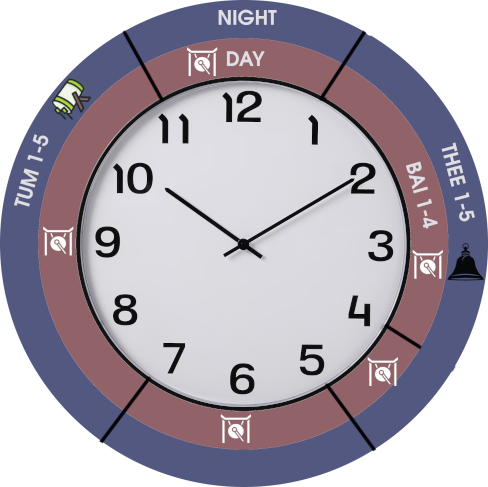Did it ever happen to you that you were standing in a bus stop in Bangkok at 7: 30 p.m. and trying to find out what time is the next bus?
Then you asking a Thai person. He scratches his head and says 2:00 o'clock. Now you are scratching your head thinking "this doesn't make sense".
Wait, I can explain!
To figure what just happened, you need to understand the Thai system of telling time.
Thai system of telling time takes us to the past when people didn't have watches.
So in order to report daytime the Thais used a the gong (kow) which makes a sound like mong. Therefore daytime hours marked with the name mong.
After 7 p.m. this becomes many gongs to count, so the Thais changed the tool to the drum. What is the sound of a drum? tum. So eventing hours are marked with tum.
Then again, at night, the tool is changed to the bell. Now we are counting hits on the bell. To hit in Thai is THEE, so night hours marked with the word thee.
First let's see how this is done in the daytime. We are dividing the daytime to morning, afternoon, and evening.
From 5:00 a.m. to 6:00 p.m. how are some number to the normal way.
From 1:00 a.m. to 4:00 p.m. they are marked with the word "bai". The problem begins from 7:00 p.m. to 11:00 p.m. the Thais starting to count from one for 7:00 p.m.
We say:
7:00 p.m. is 1-tum
8:00 p.m. is 2-tum
9:00 p.m. is 3-tum
10:00 p.m. is 4-tum
11:00 p.m. is 5-tum
Midnight has its own special word: tiang kuen.
So if for example the time supposed to be 8:00 p.m. a Thai person may be thinking 2-tum.
Then translating it in his head to English becomes 2:00 o'clock. So next bus is at 2:00 o'clock means 8:00 p.m.

HOME